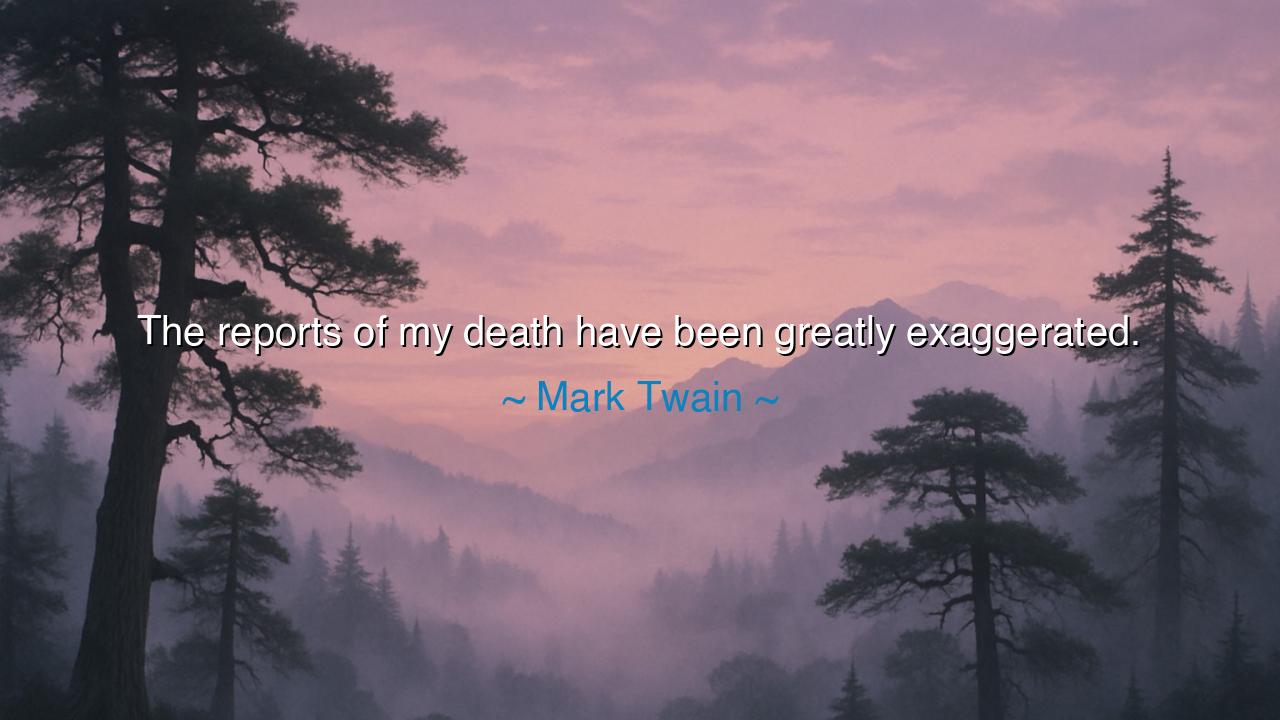
The reports of my death have been greatly exaggerated.






“The reports of my death have been greatly exaggerated.” — Mark Twain
In these immortal words, Mark Twain, that wily master of wit and wisdom, transforms what could have been a moment of misunderstanding into a timeless reflection on truth, resilience, and the absurdity of rumor. Spoken in response to false reports of his death that spread through the newspapers of his day, Twain’s line sparkles not only with humor, but with the deep, defiant laughter of a soul that refuses to be buried by lies. Beneath the jest lies a powerful truth that has echoed through the ages: do not let the voices of others write the story of your life.
The origin of this quote is as human as it is humorous. In the year 1897, rumors spread that Mark Twain — born Samuel Clemens — had died. In reality, it was his cousin who had fallen gravely ill, but the press, hungry for sensation, reported the author’s demise. When Twain was asked for comment, he responded with characteristic brilliance: “The report of my death was an exaggeration.” In later tellings, the phrase was slightly reshaped into the version the world now knows — “The reports of my death have been greatly exaggerated.” With a single stroke of wit, he turned falsehood into legend, showing that even in the face of error or attack, laughter can be the highest form of truth.
Yet, this saying extends beyond the moment of its birth. It speaks to all who have been misjudged, dismissed, or prematurely buried by the world’s opinions. How many times in life do others write us off before our time — declaring our failure, our decline, our irrelevance? Twain’s words remind us that the voice of life is stronger than the whispers of death, that one’s vitality cannot be measured by rumor or reputation. Like the phoenix of old, the human spirit has a way of rising again, proving that the living are not so easily silenced.
The ancients, too, knew this truth. They told of Socrates, condemned by his city to drink poison, yet his teachings did not die with his body. “The reports of his death,” one might say, “were greatly exaggerated,” for his ideas continued to breathe in the minds of generations to come. The same could be said of Galileo, silenced by the church but vindicated by time, or of Joan of Arc, burned by her enemies yet crowned in memory as a saint. In each case, the world declared them finished — yet their spirits endured, radiant and undefeated. Thus, Twain’s humor becomes a reflection of an ancient and universal law: truth cannot be killed, and the living soul cannot be erased by rumor.
There is also a lesson here about perspective — that laughter can be a weapon of grace against falsehood. Where a lesser man might have raged at the gossip or demanded retraction, Twain chose instead to laugh. In doing so, he robbed the lie of its power. The ancients called this the wisdom of irony — the ability to confront darkness not with anger, but with light. To laugh in the face of one’s own “death” — whether literal, reputational, or emotional — is to claim mastery over fate. It is to say, “You may speak of me as gone, but I am still here, alive and unbroken.”
Twain’s saying also teaches resilience — the art of defining oneself amid misunderstanding. Every person, at some point, will be misjudged, underestimated, or forgotten. But these moments are not the end; they are merely pauses in the great rhythm of life. The wise do not measure themselves by the gossip of others, but by the endurance of their inner fire. When the world proclaims your end, smile, and keep working. When they say you have failed, rise quietly, and continue. Let your deeds correct the rumor; let your life answer the lie.
So, my child, remember this ancient-sounding lesson born of a modern wit: when others write your obituary too soon, keep living boldly. When they say you are finished, let your next act be your reply. Twain’s words are a call to endurance and to humor — to meet the absurdities of fate not with bitterness, but with brilliance. For the spirit that can laugh in the face of its own “death” is the spirit that will never truly die.
And if ever you find yourself misrepresented or forgotten, recall the laughter of Mark Twain. Breathe deep, smile, and whisper to the world: “The reports of my death have been greatly exaggerated.” For those who keep their courage, their humor, and their truth — are never truly gone, but live on in the echo of their own defiant joy.






AAdministratorAdministrator
Welcome, honored guests. Please leave a comment, we will respond soon